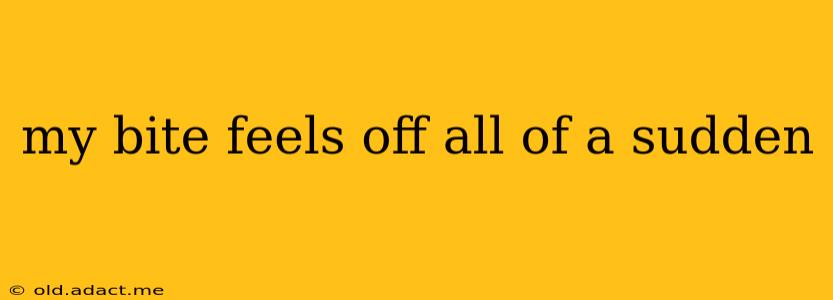My Bite Feels Off All of a Sudden: Causes and What to Do
Experiencing a sudden change in your bite can be alarming. It can range from a slight discomfort to significant pain and difficulty chewing. This isn't something to ignore; a shift in your bite can signal underlying dental or even medical issues. Let's explore the potential causes and what steps you should take if your bite suddenly feels off.
What Could Be Causing This Sudden Change in My Bite?
This is a crucial question, and unfortunately, there's no single answer. Several factors can contribute to a sudden change in your bite. Here are some of the most common:
-
Temporomandibular Joint (TMJ) Disorders: The TMJ connects your jaw to your skull. Disorders affecting this joint can cause pain, clicking, popping, and a misaligned bite. Stress, arthritis, and injury can all contribute to TMJ problems.
-
Bruxism (Teeth Grinding): Grinding your teeth, especially at night, can significantly wear down enamel and shift your bite alignment. This often happens unconsciously.
-
Dental Trauma: Even a minor injury to your mouth, such as a blow to the jaw or a chipped tooth, can alter your bite.
-
Abscess or Infection: An infection or abscess in your teeth or gums can cause inflammation and pressure, potentially affecting your bite.
-
Changes in Tooth Position: Teeth can shift naturally over time, but a sudden shift might indicate a problem needing attention. This could be due to loose teeth, gum disease, or other underlying factors.
-
Dental Work: Recently having dental work, such as fillings, crowns, or orthodontic treatment, can sometimes cause temporary changes to your bite. However, if these changes persist, it's important to get it checked.
-
Underlying Medical Conditions: In some cases, a change in bite can be a symptom of a more systemic medical issue. While rare, conditions affecting the nerves or muscles of the jaw can cause this.
Is a Misaligned Bite Serious?
A misaligned bite, also known as malocclusion, can lead to several problems if left untreated. These include:
- Chronic Jaw Pain: Persistent discomfort and pain in the jaw area.
- Headaches: Tension headaches or migraines can be linked to bite problems.
- Facial Pain: Pain in the face, often radiating from the jaw.
- Earaches: Sometimes, TMJ disorders can manifest as earaches.
- Difficulty Chewing: Inability to comfortably chew food.
- Teeth Wear and Damage: Increased wear and tear on your teeth.
- Sleep Disturbances: Difficulty sleeping due to jaw pain.
When Should I See a Dentist?
You should schedule an appointment with your dentist immediately if you experience a sudden change in your bite, especially if it's accompanied by pain, clicking, popping sounds, difficulty chewing, or facial pain. Don't delay seeking professional help.
How Does a Dentist Diagnose a Bite Problem?
Your dentist will conduct a thorough examination, likely including a visual inspection, palpation (feeling the jaw joint), and possibly X-rays to assess the underlying cause. They may also take impressions of your teeth to create models for analysis.
What Treatments Are Available for a Misaligned Bite?
Treatment depends entirely on the underlying cause. Options can range from simple adjustments to more complex procedures, including:
- Night guards or mouth guards: To protect teeth from grinding.
- Orthodontic treatment: Braces or aligners to correct misalignment.
- Restorative dentistry: Fillings, crowns, or other procedures to restore damaged teeth.
- Medication: Pain relievers or muscle relaxants for TMJ disorders.
- Physical therapy: To improve jaw muscle function and reduce pain.
Remember, this information is for general knowledge and doesn't substitute professional advice. If your bite feels off, contact your dentist promptly for a proper diagnosis and treatment plan. Early intervention is key to preventing more significant problems down the road.
